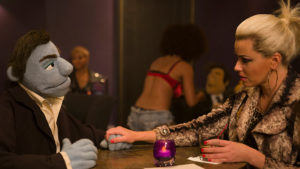A Star is Born (1954)
Judy Garland, James Mason. Written by Moss Hart. Directed by George Cukor.
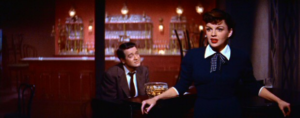 Esther Blodgett is a singer in a band when she meets Norman Maine, a Hollywood star at the very beginning of his career’s decline. Although this 1954 version is my least favorite of the four A Star is Born films, Esther and Norman’s meeting in this one is the best. Norman’s drunk when he wanders onto a stage where Esther and her band are performing. Rather than let Norman be embarrassed, Esther quickly incorporates him into the act, as if he were part of the show.
Esther Blodgett is a singer in a band when she meets Norman Maine, a Hollywood star at the very beginning of his career’s decline. Although this 1954 version is my least favorite of the four A Star is Born films, Esther and Norman’s meeting in this one is the best. Norman’s drunk when he wanders onto a stage where Esther and her band are performing. Rather than let Norman be embarrassed, Esther quickly incorporates him into the act, as if he were part of the show.
 It’s an immediate display of grace, sensitivity, talent, smarts, and self-assuredness that characterizes Esther throughout the film. If only such economy in development could be employed the rest of the way.
It’s an immediate display of grace, sensitivity, talent, smarts, and self-assuredness that characterizes Esther throughout the film. If only such economy in development could be employed the rest of the way.
Instead, we get a three-hour marathon that’s alternately engaging and sloggy. Everything we love about younger Judy Garland is right here, as if the film were written about her, and everything some of us (me) hate about 1950s movie musicals and their showtunes is right here as well, in overwrought, boring excess.
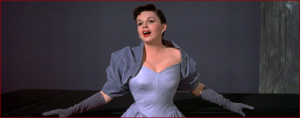 Take out most of the songs, and the film would be a pleasant length, but the filmmakers are determined to make it a comeback tour de force for Garland, who’d been out of movies for four years following the end of her time with MGM.
Take out most of the songs, and the film would be a pleasant length, but the filmmakers are determined to make it a comeback tour de force for Garland, who’d been out of movies for four years following the end of her time with MGM.
I’m grateful that this movie holds true to the original in one very important aspect of Esther’s career. Although Norman cracks the door open for Esther’s chance in the movies, Esther kicks it down with her talent, charm, and niceness. She’s pretty, but she’s not that pretty, just like the first Esther Blodgett. Some guy who has the hots for her does her a favor, but Esther makes Esther. It’s the best thing about the film.
When Esther’s first major film premieres for the Hollywood VIPs, we’re treated not only to a few minutes, but what feels like practically the entire movie. It’s misery.
Esther’s career is on the rise, while Norman’s is on a self-destructive path downward. It’s just as interesting as the original except that James Mason’s Norman Maine is not nearly as likeable as Fredric March’s and there’s really very little romantic chemistry between Garland and Mason. They’re much better and much more believable as best friends.
Could have been a great movie if not for all those songs!
6/10
61/100

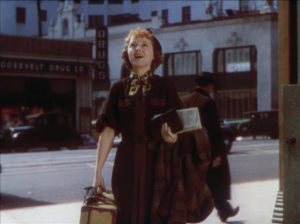 Esther Blodgett is a North Dakota farm girl with dreams of Hollywood stardom. The original A Star is Born movie pretty much begins with her family thinking she’s crazy for even entertaining the notion. Her grandma, however, believes that if you’re willing to risk everything in pursuit of your goals, you have to do it.
Esther Blodgett is a North Dakota farm girl with dreams of Hollywood stardom. The original A Star is Born movie pretty much begins with her family thinking she’s crazy for even entertaining the notion. Her grandma, however, believes that if you’re willing to risk everything in pursuit of your goals, you have to do it.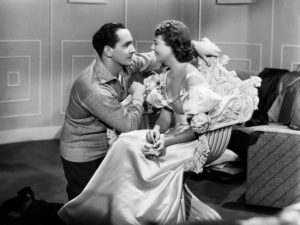 The Esther-Norman relationship drives the film, because while Esther may have needed Norman’s little boost to get through the door, she’s not at all dependent or needy in her relationship with Norman or in any other relationship. Norman clearly needs her far more than she needs him. She just really, really loves him, and he doesn’t quite know how to be loved.
The Esther-Norman relationship drives the film, because while Esther may have needed Norman’s little boost to get through the door, she’s not at all dependent or needy in her relationship with Norman or in any other relationship. Norman clearly needs her far more than she needs him. She just really, really loves him, and he doesn’t quite know how to be loved.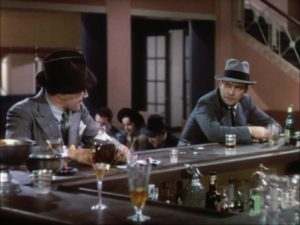 In nearly every way, A Star is Born looks and feels like the popular movies of its time, but with a smart, strong woman taking the lead. Norman is no tragic hero—he’s not a hero at all—but he’s a man loved by a woman. Could his demise have been reversed by a woman like this, or by anyone? The film seems to think not, and as Norman travels along his beautiful, downward spiral, Esther goes along with him because someone has to try.
In nearly every way, A Star is Born looks and feels like the popular movies of its time, but with a smart, strong woman taking the lead. Norman is no tragic hero—he’s not a hero at all—but he’s a man loved by a woman. Could his demise have been reversed by a woman like this, or by anyone? The film seems to think not, and as Norman travels along his beautiful, downward spiral, Esther goes along with him because someone has to try. Kayla is in the last week of eighth grade, where she’s pretty close to invisible and doesn’t seem to have any close friends. Her classmates vote her “Most Quiet,” which bugs Kayla. She doesn’t think of herself as quiet; she doesn’t want to be quiet. She has things to say, but she can’t seem to interest anyone in hearing her.
Kayla is in the last week of eighth grade, where she’s pretty close to invisible and doesn’t seem to have any close friends. Her classmates vote her “Most Quiet,” which bugs Kayla. She doesn’t think of herself as quiet; she doesn’t want to be quiet. She has things to say, but she can’t seem to interest anyone in hearing her. Because most of us were eighth-graders millions of years ago, we’re like Kayla’s dad. We see what a bright, interesting, resilient young woman Kayla is. Unlike Kayla, we also see that the young people around her, the popular kids throwing pool parties at their huge homes and the nerdy cousins and the handsome (barely pubescent) jocks all have their own growing pains.
Because most of us were eighth-graders millions of years ago, we’re like Kayla’s dad. We see what a bright, interesting, resilient young woman Kayla is. Unlike Kayla, we also see that the young people around her, the popular kids throwing pool parties at their huge homes and the nerdy cousins and the handsome (barely pubescent) jocks all have their own growing pains. Kayla takes a foray or two into the world of grownups (read: high-schoolers) where she sort-of experiences the kind of acceptance she longs for. I don’t know what such excursions were like for anyone else, but I imagine Kayla doesn’t see anything especially unusual.
Kayla takes a foray or two into the world of grownups (read: high-schoolers) where she sort-of experiences the kind of acceptance she longs for. I don’t know what such excursions were like for anyone else, but I imagine Kayla doesn’t see anything especially unusual.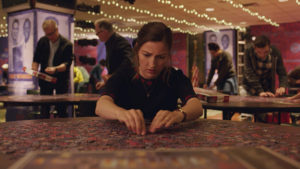 People who know me don’t have to be told I’m predisposed toward liking a movie about a middle-aged homemaker questioning her choices and discovering a love for solving jigsaw puzzles. It’s like this movie was made for me, so take my recommendation with this in mind.
People who know me don’t have to be told I’m predisposed toward liking a movie about a middle-aged homemaker questioning her choices and discovering a love for solving jigsaw puzzles. It’s like this movie was made for me, so take my recommendation with this in mind. A day after a birthday party thrown for Agnes which she seems to have done all the prepping for and cleaning up after, Agnes takes a few moments for herself, apparently a rare occurrence. One friend has given her a jigsaw puzzle as a birthday gift. She spends the day completing it, and then breaking it apart so she can complete it again.
A day after a birthday party thrown for Agnes which she seems to have done all the prepping for and cleaning up after, Agnes takes a few moments for herself, apparently a rare occurrence. One friend has given her a jigsaw puzzle as a birthday gift. She spends the day completing it, and then breaking it apart so she can complete it again.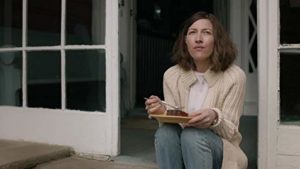 Soon, she is secretly practicing a few times a week with a new puzzle-solving partner—an independently wealthy inventor, recently single, who watches the news all day because he’s fascinated by the destruction.
Soon, she is secretly practicing a few times a week with a new puzzle-solving partner—an independently wealthy inventor, recently single, who watches the news all day because he’s fascinated by the destruction. The Spy Who Dumped Me is not the first female buddy-cop flick, but in the summer of 2018, its existence and moderate success feel like a statement. I was happy to see it just to express my support for such a film, and in fact am disappointed in the title, which refers to a male character who’s pretty much not even in the movie. This is a movie about two friends, not a man who dumps a woman.
The Spy Who Dumped Me is not the first female buddy-cop flick, but in the summer of 2018, its existence and moderate success feel like a statement. I was happy to see it just to express my support for such a film, and in fact am disappointed in the title, which refers to a male character who’s pretty much not even in the movie. This is a movie about two friends, not a man who dumps a woman. I didn’t care for the violence, which seems to push past gratuitous and into sadistic, and I mean sadistic toward its audience. People come to horrific ends, almost always men and almost always after establishing some kind of rapport with the main characters. Is this also part of the big statement? If it is, there’s probably more going on here than I thought.
I didn’t care for the violence, which seems to push past gratuitous and into sadistic, and I mean sadistic toward its audience. People come to horrific ends, almost always men and almost always after establishing some kind of rapport with the main characters. Is this also part of the big statement? If it is, there’s probably more going on here than I thought. These two younger women are vapid and giggly. Are Audrey and Morgan looking at their former selves, kind of disgusted with what they see but experienced enough to manipulate it? Or are they looking at the idea of young women in movies, nearly completely useless in a genre almost always dominated by men?
These two younger women are vapid and giggly. Are Audrey and Morgan looking at their former selves, kind of disgusted with what they see but experienced enough to manipulate it? Or are they looking at the idea of young women in movies, nearly completely useless in a genre almost always dominated by men? I never saw 2014’s The Equalizer, so The Equalizer 2 is completely fresh snow for me, and it’s not bad if you don’t mind your snow a little on the vindictive side.
I never saw 2014’s The Equalizer, so The Equalizer 2 is completely fresh snow for me, and it’s not bad if you don’t mind your snow a little on the vindictive side. Someone close to McCall is murdered, and there (apparently) aren’t very many people close to McCall, so he goes after the people responsible, only he doesn’t know who these people are. At first.
Someone close to McCall is murdered, and there (apparently) aren’t very many people close to McCall, so he goes after the people responsible, only he doesn’t know who these people are. At first. Alas, the film is directed by Antoine Fuqua, and I haven’t seen all of his movies with Denzel, but I’ve seen Training Day, a film I disliked because Denzel hams it up like an Easter brunch. Thankfully, there are only a couple of offending scenes like this here, but there was a moment where I was half-certain McCall was about to proclaim at the top of his lungs that King Kong ain’t got s*** on him. I tolerated these couple of scenes because I like the rest of this film just fine.
Alas, the film is directed by Antoine Fuqua, and I haven’t seen all of his movies with Denzel, but I’ve seen Training Day, a film I disliked because Denzel hams it up like an Easter brunch. Thankfully, there are only a couple of offending scenes like this here, but there was a moment where I was half-certain McCall was about to proclaim at the top of his lungs that King Kong ain’t got s*** on him. I tolerated these couple of scenes because I like the rest of this film just fine. Picture a world like the one in Who Framed Roger Rabbit? but instead of humans and toons, the world is cohabited by humans and puppets with serious discrimination against puppets. This is the world in which The Happytime Murders is set, only instead of some made-up town, we are right in Los Angeles with all its glamour and sleaze.
Picture a world like the one in Who Framed Roger Rabbit? but instead of humans and toons, the world is cohabited by humans and puppets with serious discrimination against puppets. This is the world in which The Happytime Murders is set, only instead of some made-up town, we are right in Los Angeles with all its glamour and sleaze.
